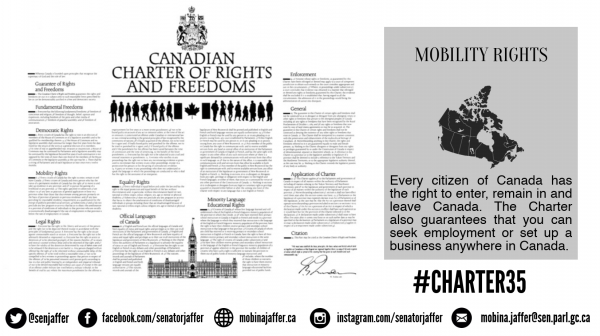
Over the past weeks, I have outlined how the mobility rights within Section 6 of the Canadian Charter of Rights and Freedoms are heavily restricted, thanks to the limitations imposed by Section 1 and the limitations written into the rights themselves. In today’s blog, I will be taking an in-depth look into the most debated restrictions on the mobility rights: those imposed upon the ‘right to a livelihood in any province’ from section 6(2)(b).
Section 6(2)(b) is often misunderstood because the word “livelihood” can be interpreted in many different ways! In a general sense, it means to have a job. However, the courts quickly narrowed this definition down to a new interpretation, stating that the mobility rights provide opportunities to get jobs, regardless of where they come from.
In theory, this means that a Canadian should not have worse job opportunities based on where they come from. In practice, that is far from the case. In 1984, the Supreme Court would make a landmark ruling in the Malarctic Hygrade Gold Mines case and rule that professional associations across Canada have the right to deny credentials based on where they were obtained.
Since this ruling, several professional associations have restricted who can work within them. For example, lawyers from outside of Quebec are not allowed to take cases within the province without first taking the province’s bar exam! Similarly, accountants from the United States are not allowed to practice in Saskatchewan without first taking the province’s accreditation exam.
While these restrictions on foreign limitations are challenged as a barrier to the right to a livelihood in any province, regardless of that person’s origins, the court accepts them as “reasonable limitations.”
In each case, they state that this practice is acceptable since the professional associations are trying to maintain a standard among people within them. For example, lawyers from outside of Quebec may not know the province’s unique civil law system. Similarly, Saskatchewan’s accounting standards are different than those in the US, so the restriction is a reasonable limitation.
While the courts have been clear on their stance regarding foreign credentials, this issue is still very today! With that said, these recent cases do not focus on whether the restrictions are violations of sections 6, and instead often fall into one of two categories.
Some people challenging this system claim that the restrictions placed on foreign credentials are often too harsh, and focus on loosening them so that they can truly be considered a “reasonable limitations.”
Other cases abandon using Section 6 entirely, and instead use section 15, which forbids discrimination based on race, national or ethnic origin, colour, religion, sex, age or mental or physical disability. According to these challenges, these credentials are rejected as a ‘legal’ way to discriminate against people who have immigrated into this country, and are thus unconstitutional!
While these cases have not led to any major changes in how Canada accepts professional credentials from abroad, they have created an ongoing discussion on whether it may be appropriate to refine or change them, so that Canadians may earn a livelihood more easily!
Please check in for my next blog, where I will be moving on to the next type of right in the Canadian Charter of Rights and Freedoms: the legal rights found in sections 7-14!